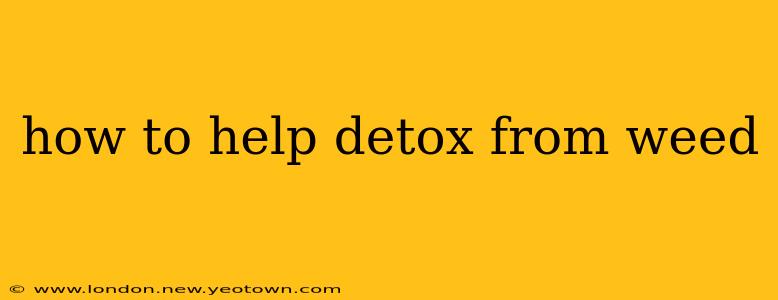How to Help Detox From Weed: A Holistic Approach to Cleansing Your System
Let's be honest, quitting weed can be tough. It's not just about physical withdrawal; it's also a mental and emotional journey. This guide explores how to help detox from weed, focusing on a holistic approach that considers your physical, mental, and emotional well-being. We'll move beyond simple detox teas and dive into strategies that truly support lasting change. My name is Sarah, and I've been working with individuals navigating substance cessation for over a decade. I've seen firsthand the power of a multifaceted approach, and I'm here to guide you.
Understanding the Detox Process:
Before we dive into specifics, it's crucial to understand that "detox" from weed doesn't just mean getting THC out of your system. While that's a part of it, the real work lies in addressing the underlying reasons for your cannabis use and building coping mechanisms for cravings and withdrawal symptoms. This is a process, not a quick fix.
What are the Withdrawal Symptoms?
This is a crucial question for anyone considering quitting. Many people experience withdrawal symptoms after stopping or significantly reducing their weed use. These can include:
- Irritability and mood swings: Feeling easily frustrated, angry, or sad is common.
- Anxiety and insomnia: Difficulty sleeping and increased feelings of worry and unease are prevalent.
- Decreased appetite: Loss of interest in food and experiencing less hunger are possible.
- Headaches: These can range from mild to severe.
- Intense cravings: Overwhelming urges to use cannabis are to be expected.
The severity of these symptoms varies from person to person, depending on factors like the frequency and amount of cannabis use, individual sensitivity, and pre-existing mental health conditions.
How Long Does it Take to Detox From Weed?
The timeframe for THC to leave your system depends on various factors:
- Frequency of use: Daily users will take longer to detox than occasional users.
- Amount used: Higher consumption leads to a longer detection period.
- Metabolism: Individual metabolic rates influence how quickly the body processes THC.
- Body fat percentage: THC stores in fat cells, so people with higher body fat might test positive longer.
While THC metabolites can be detected in urine for weeks or even months after cessation, the majority of the physical effects are typically gone within a week or two. However, the mental and emotional aspects of detox can take considerably longer.
How to Support Your Body During Detox:
Supporting your body during detox is crucial for easing withdrawal symptoms and promoting overall well-being. This isn't just about what you don't do (stop smoking weed), but what you do to nurture yourself.
- Hydration: Drinking plenty of water is essential to flush toxins from your system.
- Nutrition: Focus on a balanced diet rich in fruits, vegetables, and whole grains.
- Exercise: Physical activity can help alleviate stress, improve mood, and boost energy levels.
- Sleep: Aim for 7-9 hours of quality sleep each night.
- Supplements: Some supplements, like Omega-3 fatty acids and magnesium, may help mitigate certain withdrawal symptoms. Consult with a doctor or healthcare professional before taking any supplements, especially if you are on other medication.
Addressing Mental and Emotional Challenges:
The mental and emotional aspects of detox are often underestimated. Here's how to address them effectively:
- Mindfulness and meditation: Practices like mindfulness can help manage cravings and reduce stress.
- Therapy or counseling: A therapist can provide support, guidance, and coping strategies.
- Support groups: Connecting with others who are going through similar experiences can be incredibly helpful.
- Healthy coping mechanisms: Identify activities that help you manage stress and cravings without relying on cannabis (e.g., spending time in nature, listening to music, pursuing hobbies).
Seeking Professional Help:
Don't hesitate to reach out for professional help if you're struggling with withdrawal symptoms or finding it difficult to quit on your own. A doctor, therapist, or addiction specialist can provide personalized guidance and support.
Remember, detoxing from weed is a journey, not a race. Be patient with yourself, celebrate your successes, and don't be afraid to ask for help along the way. You've got this!

